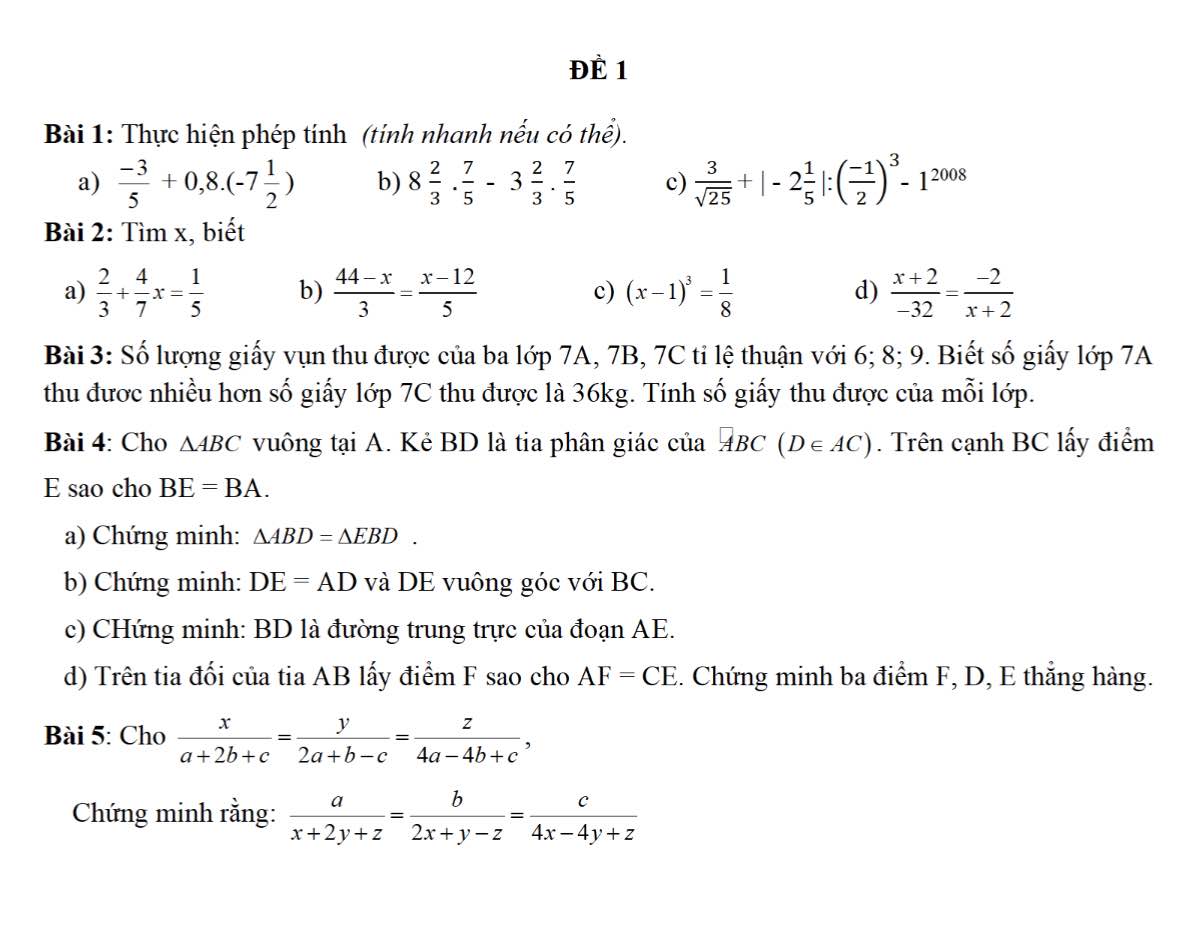
Hãy nhập câu hỏi của bạn vào đây, nếu là tài khoản VIP, bạn sẽ được ưu tiên trả lời.


+) \(x>2,5\Rightarrow\hept{\begin{cases}x-1,5>0\\2,5-x< 0\end{cases}\Rightarrow}\hept{\begin{cases}\left|x-1,5\right|=x-1,5\\\left|2,5-x\right|=x-2,5\end{cases}}\)
\(\Rightarrow\left(x-1,5\right)-\left(x-2,5\right)=3\Leftrightarrow1=3\left(VN\right)\)
+) \(1,5< x\le2,5\Rightarrow\hept{\begin{cases}x-1,5>0\\2,5-x\ge0\end{cases}\Rightarrow}\hept{\begin{cases}\left|x-1,5\right|=x-1,5\\\left|2,5-x\right|=2,5-x\end{cases}}\)
\(\Rightarrow\left(x-1,5\right)-\left(2,5-x\right)=3\Leftrightarrow2x-1=3\Leftrightarrow x=2\)
+) \(x\le1,5\Rightarrow\hept{\begin{cases}x-1,5\le0\\2,5-x>0\end{cases}\Rightarrow\hept{\begin{cases}\left|x-1,5\right|=1,5-x\\\left|2,5-x\right|=2,5-x\end{cases}}}\)
\(\Rightarrow\left(1,5-x\right)-\left(2,5-x\right)=3\Leftrightarrow-1=3\left(VN\right)\)
Vậy nhận nghiệm \(x=2\)
cảm ơn bạn nhưng mik thấy nếu x=2 thì biểu thức đó sẽ bằng 0 chứ ko phải 3 nên có lẽ bạn sai rồi!

Áp dụng tính chất của dãy tỉ số bằng nhau, ta được:
\(\dfrac{a}{\dfrac{1}{3}}=\dfrac{b}{\dfrac{1}{5}}=\dfrac{c}{\dfrac{1}{6}}=\dfrac{a-c}{\dfrac{1}{3}-\dfrac{1}{6}}=\dfrac{10}{\dfrac{1}{6}}=60\)
Do đó: a=20; b=12; c=10



`1)`
`4x-6=0`
`-> 4x=0+6`
`-> 4x=6`
`-> x=6/4=3/2`
Vậy, nghiệm của đa thức là `x=3/2`
`2)`
`5-3x=0`
`-> 3x=5-0`
`-> 3x=5`
`-> x=5/3`
Vậy, nghiệm của đa thức là `x=5/3`
`3)`
`12x+18=0`
`-> 12x=-18`
`-> x=-18/12=-3/2`
Vậy, nghiệm của đa thức là `x=-3/2`
`4)`
`2x^2-4x=0`
`x(2x-4)=0`
`->`\(\left[{}\begin{matrix}x=0\\2x-4=0\end{matrix}\right.\)
`->`\(\left[{}\begin{matrix}x=0\\2x=4\end{matrix}\right.\)
`->`\(\left[{}\begin{matrix}x=0\\x=4\div2\end{matrix}\right.\)
`->`\(\left[{}\begin{matrix}x=0\\x=2\end{matrix}\right.\)
Vậy, nghiệm của đa thức là `x={0; 2}`
`5)`
`-x^2+16=0`
`-> -x^2=-16`
`-> x^2=16`
`-> x^2=(+-4)^2`
`-> x=+-4`
Vậy, nghiệm của đa thức là `x={4; -4}`
`6)`
`(4x-3)(5+x)=0`
`->`\(\left[{}\begin{matrix}4x-3=0\\5+x=0\end{matrix}\right.\)
`->`\(\left[{}\begin{matrix}4x=3\\x=-5\end{matrix}\right.\)
`->`\(\left[{}\begin{matrix}x=\dfrac{3}{4}\\x=-5\end{matrix}\right.\)
Vậy, nghiệm của đa thức là `x={3/4; -5}`
`7)`
`(x^2+3)(3-x)=0`
`->`\(\left[{}\begin{matrix}x^2+3=0\\3-x=0\end{matrix}\right.\)
`->`\(\left[{}\begin{matrix}x^2=-3\text{(không t/m)}\\x=3\end{matrix}\right.\)
Vậy, nghiệm của đa thức là `x=3`
`8)`
`3(x-3)+2(3x-4)=0`
`-> 3x-9+6x-8=0`
`-> 9x-17=0`
`-> 9x=17`
`-> x=17/9`
Vậy, nghiệm của đa thức là `x=17/9`
`9)`
`1/2(2x-4)-0,4(x+5/4)=0`
`-> x-2-0,4x-1/2=0`
`-> 0,6x-2,5=0`
`-> 0,6x=2,5`
`-> x=2,5 \div 0,6`
`-> x=25/6`
Vậy, nghiệm của đa thức là `x=25/6`



Sao không viết câu hỏi ra đây luôn đi chứ có thể nhièu người biết mà không có sách lắm! Sao hướng dẫn được



 giúp mik với đang vội ạ
giúp mik với đang vội ạ

a) \(\dfrac{x}{2}=\dfrac{y}{3}=\dfrac{z}{4}=\dfrac{2y}{6}=\dfrac{3z}{12}=\dfrac{x+2y-3z}{2+6-12}=\dfrac{-20}{-4}=5\)
\(\Rightarrow\left\{{}\begin{matrix}x=5.2=10\\y=5.3=15\\z=5.4=20\end{matrix}\right.\)
b) \(7x=3y\Rightarrow\dfrac{x}{3}=\dfrac{y}{7}\)
Áp dụng t/c dtsbn:
\(\dfrac{x}{3}=\dfrac{y}{7}=\dfrac{x-y}{3-7}=\dfrac{16}{-4}=-4\)
\(\Rightarrow\left\{{}\begin{matrix}x=\left(-4\right).3=-12\\y=\left(-4\right).7=-28\end{matrix}\right.\)